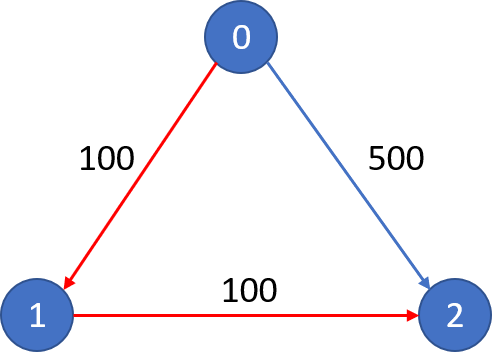There are n cities connected by m flights. Each fight starts from city u and arrives at v with a price w.
Now given all the cities and fights, together with starting city src and the destination dst, your task is to find the cheapest price from src to dst with up to k stops. If there is no such route, output -1.
Example 1: Input: n = 3, edges = [[0,1,100],[1,2,100],[0,2,500]] src = 0, dst = 2, k = 1 Output: 200 Explanation: The graph looks like this:

The cheapest price from city0to city2with at most 1 stop costs 200, as marked red in the picture.
Example 2: Input: n = 3, edges = [[0,1,100],[1,2,100],[0,2,500]] src = 0, dst = 2, k = 0 Output: 500 Explanation: The graph looks like this:

The cheapest price from city0to city2with at most 0 stop costs 500, as marked blue in the picture.
Note:
- The number of nodes
nwill be in range[1, 100], with nodes labeled from0ton- 1. - The size of
flightswill be in range[0, n * (n - 1) / 2]. - The format of each flight will be
(src,dst, price). - The price of each flight will be in the range
[1, 10000]. kis in the range of[0, n - 1].- There will not be any duplicated flights or self cycles.
Java:
class Solution {
public int findCheapestPrice(int n, int[][] flights, int src, int dst, int K) {
Map<Integer, Map<Integer, Integer>> prices = new HashMap<>();
for (int[] f : flights) {
if (!prices.containsKey(f[0])) prices.put(f[0], new HashMap<>());
prices.get(f[0]).put(f[1], f[2]);
}
Queue<int[]> pq = new PriorityQueue<>((a, b) -> (Integer.compare(a[0], b[0])));
pq.add(new int[] {0, src, k + 1});
while (!pq.isEmpty()) {
int[] top = pq.remove();
int price = top[0];
int city = top[1];
int stops = top[2];
if (city == dst) return price;
if (stops > 0) {
Map<Integer, Integer> adj = prices.getOrDefault(city, new HashMap<>());
for (int a : adj.keySet()) {
pq.add(new int[] {price + adj.get(a), a, stops - 1});
}
}
}
return -1;
}
}
Python:
class Solution(object):
def findCheapestPrice(self, n, flights, src, dst, K):
"""
:type n: int
:type flights: List[List[int]]
:type src: int
:type dst: int
:type K: int
:rtype: int
"""
adj = collections.defaultdict(list)
for u, v, w in flights:
adj[u].append((v, w))
best = collections.defaultdict(lambda: collections.defaultdict(lambda: float("inf")))
min_heap = [(0, src, K+1)]
while min_heap:
result, u, k = heapq.heappop(min_heap)
if k < 0 or best[u][k] < result:
continue
if u == dst:
return result
for v, w in adj[u]:
if result+w < best[v][k-1]:
best[v][k-1] = result+w
heapq.heappush(min_heap, (result+w, v, k-1))
return -1
Python:
class Solution(object):
def findCheapestPrice(self, n, flights, src, dst, K):
"""
:type n: int
:type flights: List[List[int]]
:type src: int
:type dst: int
:type K: int
:rtype: int
"""
f = collections.defaultdict(dict)
for a, b, p in flights:
f[a][b] = p
heap = [(0, src, k + 1)]
while heap:
p, i, k = heapq.heappop(heap)
if i == dst:
return p
if k > 0:
for j in f[i]:
heapq.heappush(heap, (p + f[i][j], j, k - 1))
return -1
C++:
// Time: O((|E| + |V|) * log|V|) = O(|E| * log|V|)
// Space: O(|E| + |V|) = O(|E|)
class Solution {
public:
int findCheapestPrice(int n, vector<vector<int>>& flights, int src, int dst, int K) {
using P = pair<int, int>;
unordered_map<int, vector<P>> adj;
for (const auto& flight : flights) {
int u, v, w;
tie(u, v, w) = make_tuple(flight[0], flight[1], flight[2]);
adj[u].emplace_back(v, w);
}
unordered_map<int, unordered_map<int, int>> best;
using T = tuple<int, int, int>;
priority_queue<T, vector<T>, greater<T>> min_heap;
min_heap.emplace(0, src, K + 1);
while (!min_heap.empty()) {
int result, u, k;
tie(result, u, k) = min_heap.top(); min_heap.pop();
if (k < 0 ||
(best.count(u) && best[u].count(k) && best[u][k] < result)) {
continue;
}
if (u == dst) {
return result;
}
for (const auto& kvp : adj[u]) {
int v, w;
tie(v, w) = kvp;
if (!best.count(v) ||
!best[v].count(k - 1) ||
result + w < best[v][k - 1]) {
best[v][k - 1] = result + w;
min_heap.emplace(result + w, v, k - 1);
}
}
}
return -1;
}
};